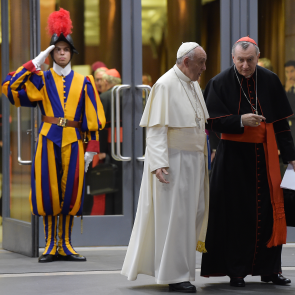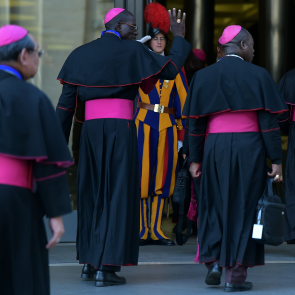The Synod on the Family is a truly international event, with participants from every corner of the globe.
This was pointed out today by the Archbishop of Philadelphia, Charles Chaput, who said that some participants felt the working document of the synod was too focussed on western concerns.
When asked by journalists today whether language used by the Church on gays was too harsh he replied that what European and North American ears hear is not the same as those in African or Asian countries.
The archbishop highlighted one of the major difficulties facing the synod and the Church as a global institution: that it is increasingly difficult to adopt a one size fits all pastoral model to diverse cultural contexts.
For many European Catholics a more merciful, flexible approach when it comes to welcoming gays and offering communion for remarried divorcees is fairly obvious. Whereas in a number of African countries and, for example, in India, where homosexuality is illegal, the idea of recognising same-sex relationships is anathema. For Africa a burning issue is polygamy while in Asia the family may be under pressure due to poverty and migration.
ALL THE LATEST FROM THE SYNOD ON THE FAMILY...
Can the Church cope with a bit of mess? - Christopher Lamb
Nichols: synod should accentuate positives in family - Christopher Lamb
Will the synod fathers be surprised by the Spirit? - Christopher Lamb
Pope: divorced and remarrieds not the only subject for synod
Synod will not change teaching on communion for divorcees - Christopher Lamb
Synod must not see family as the problem - James Roberts
The definition of “synodal” is a walking together and an exercise of governance by local churches with Rome. At the same time Pope Francis has stressed the synod is not a parliament looking for agreement or compromises.
It seems likely, therefore, that an outcome of the process will be greater powers to local churches to work out how to respond to pastoral dilemmas.
Francis has indicated that he favours such an approach, outlined in a book by the former Archbishop of San Francisco, John Quinn, in a short book Ever Ancient, Ever New: Structures of Communion in the Church which explains how a decentralisation, based on the reforms of the Second Vatican Council, could be achieved.
The book was sent to Pope Francis who told Quinn last year it was “very important”.
 Polygamy is an issue in Africa for the church, but not so much elsewhere (PA)
Polygamy is an issue in Africa for the church, but not so much elsewhere (PA)
In his intervention at the synod, the Bishop of Antwerp, Johan Bonny, put it this way: “it is important that the Synod could give to the local bishops the space and the responsibility to formulate appropriate responses to the pastoral questions that live in the portion of the People of God entrusted to their pastoral care.”
For more detailed analysis of the Synod on the Family read The Tablet newspaper -
out this Saturday 10 October
This approach is not going to be accepted by everyone.
Critics will say that the Catholic Church is heading down the route of the Anglican Communion which is struggling to maintain a semblance of unity over issues such as women bishops and gay priests while on Saturday Cardinal Vincent Nichols told me that a “Church shouldn’t get too close to a culture and absorb a culture”.
But the truth is that it is no longer feasible to expect Rome to decide pastoral questions for local churches. And unlike the Anglican Communion the Catholic Church has the Pope has its arbiter and guide.
Devolving power could also be a way round intractable disagreements on questions such as homosexuality and, without changing teaching, allow for the practical application of mercy in the form of communion to remarried divorcees.
KEEP UP TO DATE ON TWITTER...
Follow all the latest news and events from the Catholic world via The Tablet's Twitter feed @the_tablet




 Loading ...
Loading ...
What do you think?
You can post as a subscriber user ...
User comments (0)